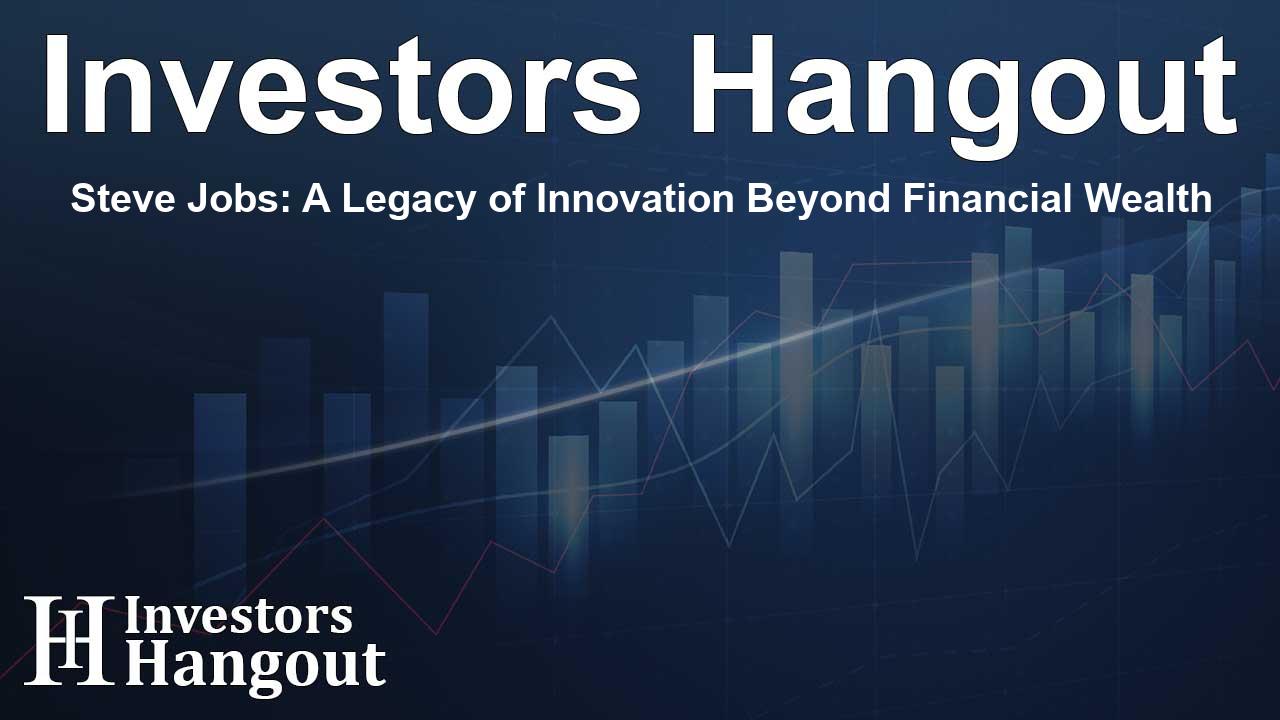Steve Jobs: A Legacy of Innovation Beyond Financial Wealth

The Impact of Steve Jobs on Technology
It’s been over a decade since the notable co-founder of Apple Inc., Steve Jobs, passed away, yet his influence on technology and our daily lives remains profound.
Early Life and Education
Jobs' journey began in San Francisco, where he was born in 1955 and later adopted. His early fascination with electronics was kindled by tinkering with gadgets in his family garage.
During his teenage years, Jobs attended Reed College. Though he left after just one semester, he pursued classes that ignited his interests, notably one in calligraphy, which later shaped Apple’s commitment to beautiful typography and design.
The Birth of Apple
In 1976, alongside his partner Steve Wozniak, Jobs co-founded Apple Computer Company in a humble garage setting. Their first product, the Apple I, was targeted at hobbyists who wanted to build their own computers.
The real breakthrough came with the Apple II in 1977, a user-friendly machine that appealed to the masses, marking the beginning of Apple's success story. Today, Apple Inc. boasts a staggering market capitalization of $3.448 trillion, showcasing its prominence in the technology sector.
Revolutionizing Computing with Macintosh
In 1984, Apple launched the Macintosh, heralding a new era in computing. This was the first widely successful computer featuring a graphical user interface and mouse, a concept that has become standard in modern computing.
Challenges and New Ventures
However, not every chapter was smooth. In 1985, amid a power struggle, Jobs departed from Apple. Unfazed, he founded NeXT, aiming to create advanced computers for the educational sector. While NeXT didn’t achieve significant market success, it laid the groundwork for future innovations at Apple.
Pixar and Animation Revolution
During his time away from Apple, Jobs acquired a computer graphics division from Lucasfilm, which became Pixar Animation Studios. Under his leadership, Pixar released groundbreaking films such as “Toy Story,” transforming animated storytelling.
Return to Apple and a New Era
By the mid-90s, Apple found itself struggling. The company re-emerged when it acquired NeXT in 1996, bringing Jobs back as an advisor and later as interim CEO. He quickly initiated a remarkable turnaround.
This period marked the beginning of an incredible revival for Apple, characterized by innovation and design simplicity that led to the introduction of iconic products.
Iconic Products That Redefined Industries
Jobs' leadership ushered in a series of transformative products:
- The iMac (1998): Brought color and design innovation to computing.
- The iPod (2001): Popularized digital music.
- The iPhone (2007): Revolutionized communication.
- The iPad (2010): Created a new category between smartphones and laptops.
Jobs’ Philosophy and Values
Jobs' legacy stems not just from his innovative products, but from his core beliefs:
Simplicity: Technology should be straightforward and user-friendly.
Design: Belief in crafting aesthetically pleasing products.
Integration: Focused on creating cohesive hardware and software experiences.
One notable quote reflecting his ethos is, "Being the richest man in the cemetery doesn’t matter to me. Going to bed at night saying we’ve done something wonderful at Apple, that’s what matters to me."
Final Years and Legacy
In 2003, Jobs faced a serious diagnosis of pancreatic cancer but remained at the helm of Apple, continuing to innovate until his resignation in 2011. He left this world on October 5, 2011, leaving behind a rich legacy that has fundamentally altered several industries, including technology and entertainment.
While Tim Cook now leads Apple, the principles laid down by Jobs continue to steer the company. Beyond Apple, his vision for technology as a means to enhance human experience has reshaped the entire tech landscape.
Jobs famously remarked, "The people who are crazy enough to think they can change the world are the ones who do." This statement encapsulates the spirit he embodied, and his impact is evident in the innovations we experience today.
Frequently Asked Questions
Who was Steve Jobs?
Steve Jobs was the co-founder of Apple Inc. and a visionary leader credited with revolutionizing personal computing and consumer technology.
What are Jobs' most famous inventions?
Jobs is known for introducing groundbreaking products like the iMac, iPod, iPhone, and iPad, which have transformed their respective industries.
What impact did Jobs have on technology?
He reshaped the technology industry by prioritizing simplicity, elegant design, and user-friendly interfaces, influencing countless products today.
How did Jobs' early education influence his career?
Jobs' early exposure to electronics and his experience in calligraphy played a significant role in his design philosophy at Apple.
What is Jobs' legacy today?
Jobs' legacy endures in the principles that guide Apple and the broader tech landscape, emphasizing innovation that enhances daily life.
About The Author
Contact Kelly Martin privately here. Or send an email with ATTN: Kelly Martin as the subject to contact@investorshangout.com.
About Investors Hangout
Investors Hangout is a leading online stock forum for financial discussion and learning, offering a wide range of free tools and resources. It draws in traders of all levels, who exchange market knowledge, investigate trading tactics, and keep an eye on industry developments in real time. Featuring financial articles, stock message boards, quotes, charts, company profiles, and live news updates. Through cooperative learning and a wealth of informational resources, it helps users from novices creating their first portfolios to experts honing their techniques. Join Investors Hangout today: https://investorshangout.com/
The content of this article is based on factual, publicly available information and does not represent legal, financial, or investment advice. Investors Hangout does not offer financial advice, and the author is not a licensed financial advisor. Consult a qualified advisor before making any financial or investment decisions based on this article. This article should not be considered advice to purchase, sell, or hold any securities or other investments. If any of the material provided here is inaccurate, please contact us for corrections.
